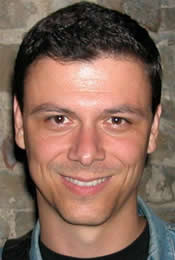 Kontakt a film by Sergej Stanojkovski participated at 2006 South East European Film Festival, held at Los Angeles. Kontakt is the story of two Macedonians, rejected by the rest of the society: Janko, an aggressive ex-convict and Zena, a girl from a psychiatry ward.
Kontakt a film by Sergej Stanojkovski participated at 2006 South East European Film Festival, held at Los Angeles. Kontakt is the story of two Macedonians, rejected by the rest of the society: Janko, an aggressive ex-convict and Zena, a girl from a psychiatry ward.
Janko violent temper has made him a pain in the neck for everybody. Prison warden wants him to disappear, even his half-brother Novak wants to get rid of him. Therefore Novak comes up with the idea of asking Janko to look after Zana. Zena is in process of being released from psychiatry ward as the mental home serves as a hideout for war criminals and has no room for the patients anymore.
Janko and Zena start a relationship over time. The young woman takes a bit of negative energy off the 40-year-old mind and they find out that they are not at all that different from each other. In fact, they have so much in common that looks like they know each other from a previous life.
Sergej Stanojkovski director of Kontakt studied at the well-known Prague film school, FAMU and graduated with Master of Arts degree in Directing and Documentary Filmmaking. During his years at school he shot several Student-Short films and developed a visual style which he still develops. He received the “Pavel Juracek Film award” for his film “NEVENA”. In July 2005 he finished his first Long-Feature-Film “Kontact” (www.kontakt-the-film.com or www.kontakt-the-movie.com ). Kintakt is an international co production (Eurimages, Macedonian Ministry of Culture, NRW Filmstiftung, Kuratorium Junger Deutscher Film, ZDF, arte).
Bijan Tehrani: What inspired you to make “Kontakt”?
Sergej Stanojkovski: Alienation of the world and human relationships in today’s modern life is a subject that was inspiring. During developing the screenplay, 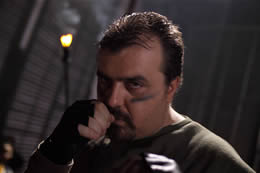 pre-producing and shooting we find more and more parallels to our characters and the world that is surrounding us. In the prison location the story of Zana and Janko happened for real to a prisoner. In the psychiatry we found the same story of Zana….
pre-producing and shooting we find more and more parallels to our characters and the world that is surrounding us. In the prison location the story of Zana and Janko happened for real to a prisoner. In the psychiatry we found the same story of Zana….
Bijan: The two main characters of Kontakt are two loners and have quite odd personalities. Both of them have been forced out of the social life. Why did you choose these characters?
Sergej: These two loners, misfits, somehow characterize a society; their relationship characterizes a real society and the traces that a society leaves on individuals. Then again these two characters symbolize our time: What can be more beautiful then to be loved by someone, and than to know that someone loves us. And these two lost souls in a certain moment of life, experience that there is someone, although very different and from a different social background, who is thinking of them, devoting time to them and loving them. Through these two characters we could show these eternal needs for love: to get and to give love….
Bijan: The love between Janko and Zana is offering a hope for them, a way out of troubles. How do you define this love?
Sergej: The answer in a way is given above. Hope dies last. And our film ends with hope, at the end there is hope. In a way this story is an allegory on love. Love is a very wide term. In our film we do not treat love as physical idea; the characters actually touch each other only twice, they have only two “Kontakt”. It is a spiritual love, an esoteric love. It’s a story about humanity, love that gives you hope. Janko hides his ability to love, and the physically weak Zana gives him the ability to love. Janko discovers his ability to love and devote to one person, he finds hope.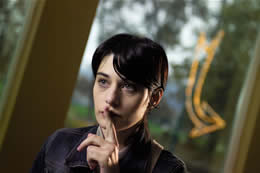 Bijan: Do you find love a solution for our troubled time?
Bijan: Do you find love a solution for our troubled time?
Sergej: This is a very hard question to reply in short, it is a very complex subject as we face problems which are beyond to be solved by love. Our world and lives has became very complicated, the world has become smaller and relationships between individuals, nations, countries has became difficult. I don’t think there is more crime and aggression then there was before, but we are more informed about all that happens today. In this troubled, particularly chaotic time, love is one of the solutions. It is eternal, it has no borders, it speaks one universal language, it does not divide nations and religions, in a certain way it is a moral codex to make life easier, and in those terms it is a solution. If you read today Rumi (13th century) and Hafiz (14th century) poems, the poems of love, they sound like being written today (we thought of a film based on Rumi and Hafiz and intriguing is the idea on how to visualize the poems), love does not know time, it is “now” and “always”….
Bijan: The way that you treat time and location in Kontakt, gives it a more universal feel.
Sergej: I am very happy that you have that feeling…
Bijan: Is this a right understanding?
Sergej: Yes, absolutely. That is what we wanted to achieve. J.J. Louisburg from the British film council said, “Kontakt shows a maturity that goes beyond the stigma of wacky Eastern European cinema. It confidently handles a broader genre without defying its heritage!”
I am very glad about this, as this is what our aim was. It is not the usual Eastern European or Balkan film; its subject is not the war. It is not a naturalistic, socio-analytical drama of society. In a certain way it is a poem on two people—on humans—and these two humans have emotions that are similar to those of all the 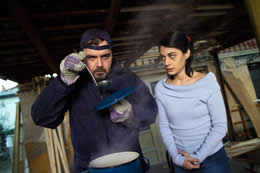 people around the world. There is something Shakespearean in it, in the drama. It is in a way a “Kammerspiel” a Chamber play. With the locations, we don’t actually see too many wide-shots of the city. We see some short ones and otherwise it all happens in a few locations which we tried to build in a way that they are not just realistic but should dramatize the story and characterize the characters and the development of the relationship of the two main characters. As they come to the house, the house is a ruin as is the inner life, the emotional life of the characters and their personalities. The house is getting rebuilt more and more as is the relationship developing and those two characters start developing a stronger emotional life and relationship. That’s how we treated the locations when scouting and when discussing with the cinematographer and the production designer. Tom Pinter, the cinematographer, did a great job with the atmosphere (he received the best cinematography award at the Brooklyn FF) and the way how he photographed the decor. Modern film develops in the direction that Rouben Mamoulian, the great Armenian-American director who shot the first color movie, put it: not to use color realistically but to use it dramatically as the scenes and film develop. For me the production design and the locations is the envelope where the story and characters are placed. It gives a certain melody in the background of the story, a visual flair.
people around the world. There is something Shakespearean in it, in the drama. It is in a way a “Kammerspiel” a Chamber play. With the locations, we don’t actually see too many wide-shots of the city. We see some short ones and otherwise it all happens in a few locations which we tried to build in a way that they are not just realistic but should dramatize the story and characterize the characters and the development of the relationship of the two main characters. As they come to the house, the house is a ruin as is the inner life, the emotional life of the characters and their personalities. The house is getting rebuilt more and more as is the relationship developing and those two characters start developing a stronger emotional life and relationship. That’s how we treated the locations when scouting and when discussing with the cinematographer and the production designer. Tom Pinter, the cinematographer, did a great job with the atmosphere (he received the best cinematography award at the Brooklyn FF) and the way how he photographed the decor. Modern film develops in the direction that Rouben Mamoulian, the great Armenian-American director who shot the first color movie, put it: not to use color realistically but to use it dramatically as the scenes and film develop. For me the production design and the locations is the envelope where the story and characters are placed. It gives a certain melody in the background of the story, a visual flair.
By the way, this story could also be set in another environment like the USA, Germnay, or the UK as long as it went through some precise changes.
Bijan: How did you deal with the casting of the movie?
Sergej: We did a lot of casting all around Europe, including the UK. When we were finished, all of the actors were from Macedonia, besides one who is from Serbia. We did a huge casting in Macedonia. It was not only important how individual actors performe according to the role/character but that they fit together well, especially Zana and Janko. I had Labina Mitevska in mind from the early along in the development of the project. The screenwriter Gordan Mihic suggested Nikola Kojo, and these were two good decisions. Nikola Kojo never before did a main role in a character drama and besides that he had to act in a foreign language and all of these worked so great. Labina I had seen in many films but none of the roles had such a strong psychological impact in the character’s development as the role in “Kontakt”. We then did quite a bit of research and visited a psychiatrist. Now I am happy that I have heard some critics saying that this is Nikola Kojo’s “best role” and the audience loves Labina in “Kontakt”. The film received in an award in Germany for the directing of the actors. Other roles were played by diverse actors, some who have acted before in films, others for the first time. I loved Peter Mirchevski in the role of Novak. The father of Zana is played by Guener Ismael who had never been in a film before; I loved his face because it speaks without saying a word. Guener was in the security council of the President at that time and almost impossible to get, so I invited him for whiskey, explained my idea of the film to him as well as his role in the film, and he accepted.
Bijan: Going through the actors names proves that you have combined experience of the older actors with freshness of the young actors. How did you achieve that?
Sergej: Yes. This has diverse aspects which cross each other. An old saying is: half the directing is the casting. We had F.E. experienced actors who had experience in TV or theatre but not film and this provided a challenge. Then there were younger actors who had less theatre but more film experience. Then we had actors who had none of it and we had actors who are TV talk masters or have another profession. I studied in Prague in the Czech Republic which is also known for its tradition to work with “non-actors”. This influence actually comes from the Italian Neo-realists who again were influenced by the Russian films from the 20’s and 30’s— films with real people. I also like to work particularly in this way. Other then in theater where the actor has time to develop, in cinema the actor has no time to develop his look; he is seen just as the camera photographed him and that’s because film has a documentary-photography character. So for film the photogenic aspect of the actor is important. All of the characters in “Kontakt” are, in my opinion, photogenic and although some of them appear just once or twice, you remember them exactly! This is A) Because they were written like that, B) Because we cast them according to that, or C) Because they were photographed accordingly.
The screenplay was written by Gordan Mihic in a way that it gives a lot of room to the director and the actors to create and develop the characters. Gordan Mihic is the most productive screenwriter I know. He writes lively characters— characters that live not just on paper but in life. He is one of the greatest screenwriters of our time. I planned my direction to be discreet.
I wanted the camera to be discreet, to watch, to follow the characters, the faces of the actors, the mimicry, and the eyes and how they watch each other. This is a story carried by characters, not by expressionist camera movement and lighting or special effects. We intended to catch the ‘soul’ of the characters. So actually I did not give many instructions to the actors. We did rehearsals, we had a good script and then we just let the emotion of the actors flow in front of the camera. What is important is that one believes the actors. Once you don’t believe the emotion of the actor, it withdraws the viewer from the illusion. Again, my collaboration with Tom Pinter was very important and inspiring. I learned a lot from him regarding how to shoot the actor. Tom is a wonderful cinematographer; he worked F.E. with Caleb Deschanel and if you take a look at IMDB and you’ll see that he did wonderful movies.
Bijan: What were the challenges you faced while making “Kontakt”?
Sergej: In filmmaking everything is a challenge! Actually while making a film there are no problems, everything is just a challenge. Filmmakers are inventors; Inventors in terms of money, technique, poetry, drama…everything. One invents a new world. Look at films of Michelangelo Antonioni; he invented his world in these amazing beautiful movies he made.
Once we had a screenplay for Kontakt, I started looking for co-producing partners. Not to lose time, I also prepared a huge part of the production process and became one of the producers of the film. Once I raised part of the budget, it was easier to find further co-producing partners. As you know, we have in Europe a 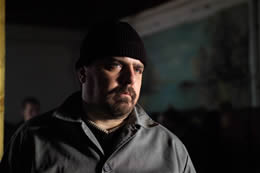 finance system (which is quite complex) that is particularly more art and culture driven then the USA system. The basic difference between the USA and Europe is this: in Europe, film is culture and art (mostly, of course there are also entertainment based films). In the USA, film is entertainment. Once all of the producing partners from Macedonia and Germany were in the boat we had challenges with how to build up the production-finance-cash flow, amongst other challenges. The European funds have very strict rules. They do finance big pieces of culture and art however the rules for spending the money bring the producer many sleepless nights. These sleepless nights lasted for some 12 months. Once all was settled financially we faced another problem. A certain amount of the money that was necessary would only be given to us if we started shooting ASAP. Winter was knocking on the door and we needed late summer, autumn, or spring. It was take-it-or-leave-it. So we took it and shot in November / December. We had luck: the whether was mostly sunny then the last day of shooting it started snowing. Instead of 36 shooting days we shot in 33 or 34 days. The challenging thing in Europe is,when you make co-productions, you work with people from different countries with very different cultural, historic, social and economic backgrounds who also come from different economic systems. Things then become challenging in fixing the bilateral or trilateral contracts. However, every day brings new challenges. At the end we had the best we could get. With our film we had the best funding partners that you could wish for the first feature: The Ministry and Government/State of the Republic of Macedonia, New Filmstiftung was our biggest German funder, Arte French broadcaster, ZDF German broadcaster, and Eurimages. We also worked with great personalities such as Gordan Mihic, Peer Raben, Tom Pinter and others. Bringing all theses international funds and people together into one family, in time, on schedule, and into one family – that was a great challenge
finance system (which is quite complex) that is particularly more art and culture driven then the USA system. The basic difference between the USA and Europe is this: in Europe, film is culture and art (mostly, of course there are also entertainment based films). In the USA, film is entertainment. Once all of the producing partners from Macedonia and Germany were in the boat we had challenges with how to build up the production-finance-cash flow, amongst other challenges. The European funds have very strict rules. They do finance big pieces of culture and art however the rules for spending the money bring the producer many sleepless nights. These sleepless nights lasted for some 12 months. Once all was settled financially we faced another problem. A certain amount of the money that was necessary would only be given to us if we started shooting ASAP. Winter was knocking on the door and we needed late summer, autumn, or spring. It was take-it-or-leave-it. So we took it and shot in November / December. We had luck: the whether was mostly sunny then the last day of shooting it started snowing. Instead of 36 shooting days we shot in 33 or 34 days. The challenging thing in Europe is,when you make co-productions, you work with people from different countries with very different cultural, historic, social and economic backgrounds who also come from different economic systems. Things then become challenging in fixing the bilateral or trilateral contracts. However, every day brings new challenges. At the end we had the best we could get. With our film we had the best funding partners that you could wish for the first feature: The Ministry and Government/State of the Republic of Macedonia, New Filmstiftung was our biggest German funder, Arte French broadcaster, ZDF German broadcaster, and Eurimages. We also worked with great personalities such as Gordan Mihic, Peer Raben, Tom Pinter and others. Bringing all theses international funds and people together into one family, in time, on schedule, and into one family – that was a great challenge
Bijan: What are your plans for international distribution of “Kontakt”?
Sergej: Kontakt is now represented by the world sales agent Eastwest-Distrubution, located in London and Vienna; they also have an office in L.A. The film has been invited to 40 international film festivals in 12 months on every continent. It is now selling to different territories and we hope soon to be represented in the North American territory. Of course, for an independent film this is sometimes quite a challenge to get to this audience. However, “Kontakt” is absolutely audience movie where people of all ages and social backgrounds laugh and cry.
Bijan: What led you to become a filmmaker?
Sergej: Some things happened as a chain reaction. I started in Theatre School and then as photographer. I then studied camera for 2 years and finally studied in Prague at the Film Academy for Documentary films and Directing. I began work in theatre. However, film is the youngest of the arts; it unifies diverse talents but first of all is the need to express through a dramatic form of art, combined with the visual and photographic character of film. This combination of a young art and drama has roots in ancient times. Film is the youngest step of the development of the art of drama with its beginnings in ancient times with shamanic rituals. Through the development of modern technologies we will probably explore new possibilities but the interesting thing is that all stories are already told long ago. Discovering and telling stories with emotion and the mysteries of human existence make film so exciting.
Bijan: Who are the filmmakers that you admire?
Sergej: I would say that I appreciate the work of plenty of filmmakers.
I do like Michelangelo Antonioni. “Cronaca di un amore” and the films in the 50’s and then the masterpieces of “L’avventura,” “La notte,” “L’eclisse,” and “Il deserto rosso”. When Francis Coppola saw “L’avventura” he was thrilled.
Some of the filmmakers whose work I love to see again and again are Kurosawa and his “Rashomon” or “Seven Samurai”, Francis Coppola’s “The Godfather” and some of his other works. F.W.Murau made some great inspirational films and also Pabst in the 20s and 30s in Germany. Murnau’s “Sunrise”. There is an amazing film on love by Robert Siodmak, Fred Zinnemann and Billy Wilder called “Abschied” from the 1930’s. “Sunset Boulevard” is beautiful. The “Father Film” 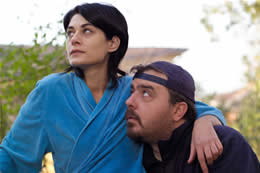 of the French New Wave: “Moi un noir” by Jean Rouch, this film influenced Godard and Truffaut. Fellini did some very nice movies. The Russian director Andrej Tarkovskij: I like his film “Mirror”very much and he was a great European master-director, a great artist. I like Pudovkin’s “Storm over Asia”. A forgotten genius Gustav Machaty and his masterpieces “Extras,” “Erotikon,” and “From Saturday to Sunday.” I like Finchers “Seven”. I love Gillo Pontecorvos “La battaglia di Algeri”. Michael Mann’s “Heat”. A director from whom I learned a lot is the Czech director Otakar Vavra. Hitchcock’s films are beautiful. Fritz Lang’s “M”. Peter Bogdanovich made very interesting films. Jerry Lewis: beside his films, there is a wonderful book by Jerry Lewis “The Total Filmmaker.” They should have that in every film school. A great documentary I love is Mikhail Romm’s “Obyknovenyy Fashizm” (A night of thoughts/Ordinary fascism/Triumph over violence). I also admire Welles’ “Citizen Kane”. A funny story is that the DOP of “Kontakt” was also the DOP of Orson Welles’ “F for Fake”; an amusing documentary. Unfortunately he could not be credited for the reasons of the union’s policy at that time. I love, very much, Satajit Ray’s “Apu trilogy” and just recently I met in Calcutta the actor who played Apu in Ray’s movies. Other filmmakers who made beautiful films I love were Flaherty, Grierson and Wright, and Dziga Vertov. I love the Bond movies and the character of Bond: this guy who is going to save us all from evil, sacrificing himself for the better of our society.
of the French New Wave: “Moi un noir” by Jean Rouch, this film influenced Godard and Truffaut. Fellini did some very nice movies. The Russian director Andrej Tarkovskij: I like his film “Mirror”very much and he was a great European master-director, a great artist. I like Pudovkin’s “Storm over Asia”. A forgotten genius Gustav Machaty and his masterpieces “Extras,” “Erotikon,” and “From Saturday to Sunday.” I like Finchers “Seven”. I love Gillo Pontecorvos “La battaglia di Algeri”. Michael Mann’s “Heat”. A director from whom I learned a lot is the Czech director Otakar Vavra. Hitchcock’s films are beautiful. Fritz Lang’s “M”. Peter Bogdanovich made very interesting films. Jerry Lewis: beside his films, there is a wonderful book by Jerry Lewis “The Total Filmmaker.” They should have that in every film school. A great documentary I love is Mikhail Romm’s “Obyknovenyy Fashizm” (A night of thoughts/Ordinary fascism/Triumph over violence). I also admire Welles’ “Citizen Kane”. A funny story is that the DOP of “Kontakt” was also the DOP of Orson Welles’ “F for Fake”; an amusing documentary. Unfortunately he could not be credited for the reasons of the union’s policy at that time. I love, very much, Satajit Ray’s “Apu trilogy” and just recently I met in Calcutta the actor who played Apu in Ray’s movies. Other filmmakers who made beautiful films I love were Flaherty, Grierson and Wright, and Dziga Vertov. I love the Bond movies and the character of Bond: this guy who is going to save us all from evil, sacrificing himself for the better of our society.
Bijan: Please tell us about your future projects.
Sergej: Temporarily I am doing a small project with a school. I teach at a university and I am preparing some short film projects. My next feature film project has the working title “5th & 6th Violin” and is also known as “The Love Carousel”. We presented this film at this year’s 1st Rome Film Festival in the New Cinema section. The screenplay is written by Gordan Mihic, the main producer is Karl Baumgartner from the German “Pandora Film Production” and we are now finishing the screenplay. It is going to be a comedy with elements of tragedy. We are also developing two screenplays with Gordan Mihic in order to write them after finishing the “Love Carousel”.

